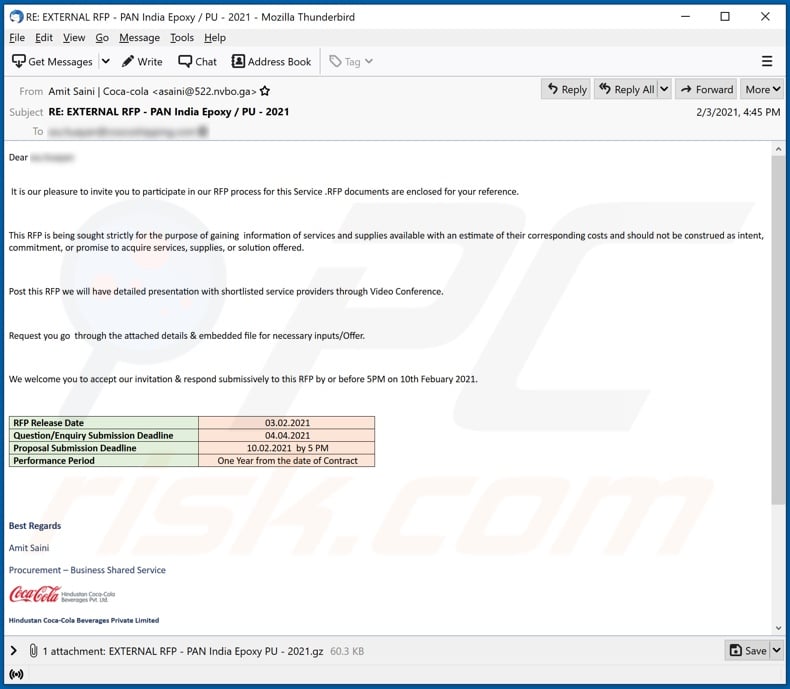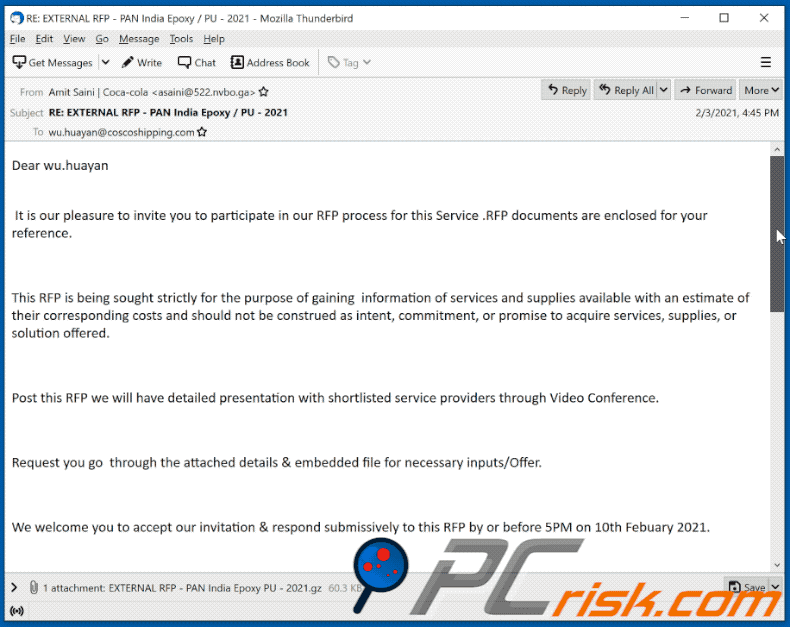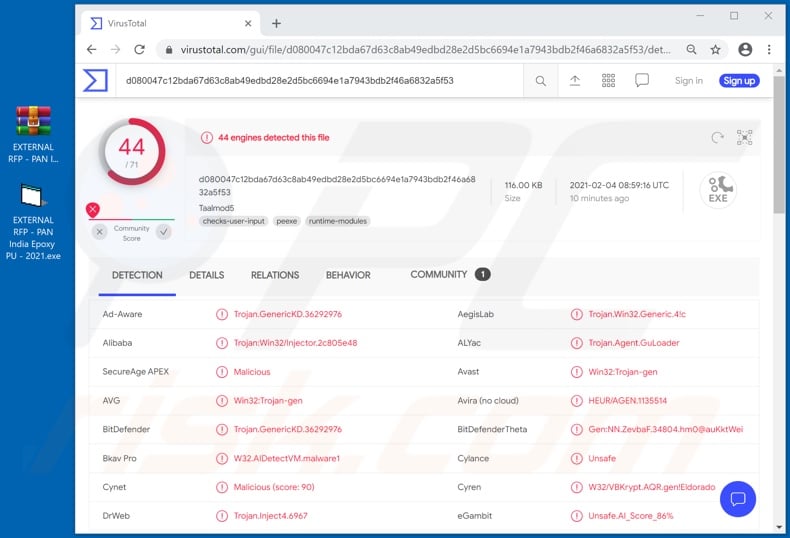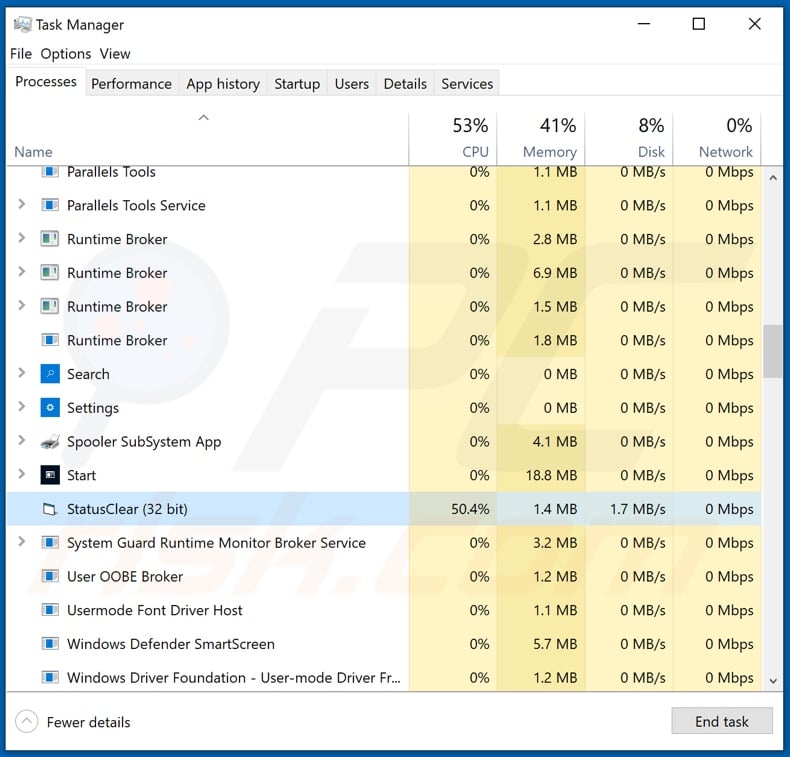Get free scan and check if your device is infected.
Remove it nowTo use full-featured product, you have to purchase a license for Combo Cleaner. Seven days free trial available. Combo Cleaner is owned and operated by RCS LT, the parent company of PCRisk.com.
What is the "Coca Cola" scam email?
"Coca Cola email virus" refers to a spam campaign proliferating GuLoader malware. The term "spam campaign" defines a mass-scale operation during which thousands of scam emails are sent. The messages distributed through this campaign are disguised as Request for proposals (RFPs) from Coca Cola.
Note that these emails are in no way associated with The Coca-Cola Company. The scam messages have infectious files attached to them, which contain GuLoader malware. This malicious program is designed to infect systems with additional malware (e.g., Trojans, ransomware, cryptominers, etc.).

The "Coca Cola email virus" scam messages are presented as non-binding RFPs. A Request for proposal (RFP) is a document requesting submission of a proposition concerning procurement of a product, commodity, service, or other assets, issued to potential suppliers by an interested entity.
The deceptive emails stress that the RFP is not to be taken as binding. The messages are supposedly geared towards gathering information about services/supplies available within estimated price ranges. Recipients are given deadlines to review and submit their offers.
In fact, the attachments do not contain the information that is stated in the scam emails. Instead, opening the files triggers download/installation of GuLoader. As mentioned, GuLoader can infect devices with a wide variety of malware. It has been observed infecting systems with various Remote Access Trojans (RATs) and stealer-type malware.
RATs operate by stealthily enabling remote access and control over the infected machine. These Trojans can have especially varied capabilities - they can gain control over the device's hardware, software, and content stored and accessed through the infected computer.
Common functionalities of RATs include (but are not limited to): extracting system/user information, downloading stored content (e.g., files), taking screenshots, recording/streaming video and audio via webcams and microphones, infiltrating/executing malicious files (i.e., causing chain infections), recording keystrokes (keylogging), and so on.
The primary purpose of stealer malicious programs is obtaining confidential/private data from browsers and other applications. Data of interest includes: browsing/search engine histories, internet cookies, personally identifiable information (e.g., names, surnames, addresses, etc.), and account log-in credentials (e.g., IDs, usernames, and passwords).
It is also possible that GuLoader will download/install other types of malware. Ransomware operates by encrypting data and/or locking the device's screen in order to demand payment for decryption/access recovery. Cryptominers use system resources (possibly to the point of causing permanent damage) to mine cryptocurrency.
To summarize, by trusting the "Coca Cola email virus" scam messages, users can experience system infections, data/device damage, severe privacy issues, financial losses, and identity theft. If it is suspected that GuLoader (or other malware) has already infected the system, use anti-virus software to remove it immediately.
| Name | Coca Cola spam |
| Threat Type | Trojan, password-stealing virus, banking malware, spyware. |
| Hoax | Scam emails are presented as RFPs (Request for proposal) from Coca Cola |
| Attachment(s) | EXTERNAL RFP - PAN India Epoxy PU - 2021.exe |
| Detection Names | Avast (Win32:Trojan-gen), BitDefender (Trojan.GenericKD.36292976), ESET-NOD32 (A Variant Of Win32/Injector.EOKN), Kaspersky (Trojan.Win64.Agent.qwhwav), Microsoft (Trojan:Win32/Casdet!rfn), Full List Of Detections (VirusTotal) |
| Symptoms | Trojans are designed to stealthily infiltrate the victim's computer and remain silent, and thus no particular symptoms are clearly visible on an infected machine. |
| Payload | GuLoader |
| Rogue Process Name | StatusClear (process name may vary) |
| Distribution methods | Infected email attachments, malicious online advertisements, social engineering, software 'cracks'. |
| Damage | Stolen passwords and banking information, identity theft, the victim's computer added to a botnet. |
| Malware Removal (Windows) |
To eliminate possible malware infections, scan your computer with legitimate antivirus software. Our security researchers recommend using Combo Cleaner. Download Combo CleanerTo use full-featured product, you have to purchase a license for Combo Cleaner. 7 days free trial available. Combo Cleaner is owned and operated by RCS LT, the parent company of PCRisk.com. |
"Enel Email Virus", "METZA Email Virus", "Cobra Industrial Machines", and "Payment Schedule" are some examples of other malware-spreading spam campaigns. The scam emails are usually disguised as "official", "important", "urgent", "priority", and similar.
The messages are not used exclusively to proliferate malicious software. They are also employed to facilitate phishing and various other scams. Due to spam mail's prevalence, exercise caution with incoming emails.
How did "Coca Cola email virus" infect my computer?
Malware (including ransomware) is usually distributed via malspam campaigns, unofficial software activation ('cracking') tools, Trojans, dubious file/software download sources, and fake software updating tools.
When cyber criminals attempt to distribute malware via malspam campaigns, they send emails that contain malicious attachments or download links for malicious files. Typically, they disguise their emails as official and important. If recipients open the attached file (or a file downloaded via a website link), they cause installation of malicious software.
Cyber criminals commonly attach executable files (.exe), archive files such as RAR, ZIP, PDF documents, JavaScript files and Microsoft Office documents to their emails. Software 'cracking' tools supposedly activate licensed software illegally (bypass activation), however, they often install malicious programs and do not activate any legitimate installed software.
Trojans are other rogue programs that can cause chain infections. I.e., when a Trojan is installed on the operating system, it can install additional malware.
Free file hosting websites, freeware download websites, Peer-to-Peer networks (e.g., torrent clients, eMule), unofficial websites, and third party downloaders are examples of other sources that are used to distribute malware. Cyber criminals disguise malicious files as legitimate and regular. When users download and open them, they inadvertently infect their computers with malware.
Fake software updating tools install malicious software rather than updates/fixes for installed programs, or they exploit bugs/flaws of outdated software that is installed on the operating system.
How to avoid installation of malware
To avoid malware spread via spam mail, you are strongly advised against opening suspicious or irrelevant emails, especially those with any attachments or links present within them.
Additionally, use Microsoft Office versions released after 2010. Malicious programs also proliferate through untrusted download channels (e.g. unofficial and free file-hosting sites, Peer-to-Peer sharing networks and other third party downloaders), illegal software activation ("cracking") tools, and fake updaters.
Therefore, only download from official/verified sources and activate and update software with tools/functions provided by legitimate developers.
To ensure device integrity and user privacy, have a reputable anti-virus/anti-spyware suite installed and kept updated. Furthermore, use these programs to run regular system scans and to remove detected/potential threats.
If you have already opened "Coca Cola email virus" attachment, we recommend running a scan with Combo Cleaner Antivirus for Windows to automatically eliminate infiltrated malware.
Text presented in the "Coca Cola email virus" message:
Subject: RE: EXTERNAL RFP - PAN India Epoxy / PU - 2021
Dear -
It is our pleasure to invite you to participate in our RFP process for this Service .RFP documents are enclosed for your reference.
This RFP is being sought strictly for the purpose of gaining information of services and supplies available with an estimate of their corresponding costs and should not be construed as intent, commitment, or promise to acquire services, supplies, or solution offered.
Post this RFP we will have detailed presentation with shortlisted service providers through Video Conference.
Request you go through the attached details & embedded file for necessary inputs/Offer.
We welcome you to accept our invitation & respond submissively to this RFP by or before 5PM on 10th Febuary 2021.
RFP Release Date 03.02.2021
Question/Enquiry Submission Deadline 04.04.2021
Proposal Submission Deadline 10.02.2021 by 5 PM
Performance Period
One Year from the date of Contract
Best Regards
Amit Saini
Procurement – Business Shared Service
cid:image001.png@01D563D6.68E050A0
Hindustan Coca-Cola Beverages Private Limited
Brigade Magnum | B-Wing | 7th , 8th & 9th Floor
Bellary Road | Kodigehalli Gate | Amruthahalli | Bangalore – 560092.
(080 39607200 | ) Extn: 7209 | (+91 7389939651
* asaini@coca-cola.in | Web- www.hccb.in
CONFIDENTIALITY NOTICE This message is intended for the use of the individual or entity to which it is addressed and may contain information that is confidential, privileged and exempt from disclosure under applicable law. If the reader of this message is not the intended recipient, you are hereby notified that any printing, copying, dissemination, distribution, disclosure or forwarding of this communication is strictly prohibited. If you have received this communication in error, please contact the sender immediately and delete it from your system. Thank You.
Appearance of the "Coca Cola" scam email (GIF):

Screenshot of VirusTotal detections of the malicious attachment distributed via "Coca Cola email virus" spam campaign ("EXTERNAL RFP - PAN India Epoxy PU - 2021.exe"):

Screenshot of the malicious executable process in Windows Task Manager ("StatusClear"):

Instant automatic malware removal:
Manual threat removal might be a lengthy and complicated process that requires advanced IT skills. Combo Cleaner is a professional automatic malware removal tool that is recommended to get rid of malware. Download it by clicking the button below:
DOWNLOAD Combo CleanerBy downloading any software listed on this website you agree to our Privacy Policy and Terms of Use. To use full-featured product, you have to purchase a license for Combo Cleaner. 7 days free trial available. Combo Cleaner is owned and operated by RCS LT, the parent company of PCRisk.com.
Quick menu:
- What is Coca Cola spam?
- Types of malicious emails.
- How to spot a malicious email?
- What to do if you fell for an email scam?
Types of malicious emails:
![]() Phishing Emails
Phishing Emails
Most commonly, cybercriminals use deceptive emails to trick Internet users into giving away their sensitive private information, for example, login information for various online services, email accounts, or online banking information.
Such attacks are called phishing. In a phishing attack, cybercriminals usually send an email message with some popular service logo (for example, Microsoft, DHL, Amazon, Netflix), create urgency (wrong shipping address, expired password, etc.), and place a link which they hope their potential victims will click on.
After clicking the link presented in such email message, victims are redirected to a fake website that looks identical or extremely similar to the original one. Victims are then asked to enter their password, credit card details, or some other information that gets stolen by cybercriminals.
![]() Emails with Malicious Attachments
Emails with Malicious Attachments
Another popular attack vector is email spam with malicious attachments that infect users' computers with malware. Malicious attachments usually carry trojans that are capable of stealing passwords, banking information, and other sensitive information.
In such attacks, cybercriminals' main goal is to trick their potential victims into opening an infected email attachment. To achieve this goal, email messages usually talk about recently received invoices, faxes, or voice messages.
If a potential victim falls for the lure and opens the attachment, their computers get infected, and cybercriminals can collect a lot of sensitive information.
While it's a more complicated method to steal personal information (spam filters and antivirus programs usually detect such attempts), if successful, cybercriminals can get a much wider array of data and can collect information for a long period of time.
![]() Sextortion Emails
Sextortion Emails
This is a type of phishing. In this case, users receive an email claiming that a cybercriminal could access the webcam of the potential victim and has a video recording of one's masturbation.
To get rid of the video, victims are asked to pay a ransom (usually using Bitcoin or another cryptocurrency). Nevertheless, all of these claims are false - users who receive such emails should ignore and delete them.
How to spot a malicious email?
While cyber criminals try to make their lure emails look trustworthy, here are some things that you should look for when trying to spot a phishing email:
- Check the sender's ("from") email address: Hover your mouse over the "from" address and check if it's legitimate. For example, if you received an email from Microsoft, be sure to check if the email address is @microsoft.com and not something suspicious like @m1crosoft.com, @microsfot.com, @account-security-noreply.com, etc.
- Check for generic greetings: If the greeting in the email is "Dear user", "Dear @youremail.com", "Dear valued customer", this should raise suspiciousness. Most commonly, companies call you by your name. Lack of this information could signal a phishing attempt.
- Check the links in the email: Hover your mouse over the link presented in the email, if the link that appears seems suspicious, don't click it. For example, if you received an email from Microsoft and the link in the email shows that it will go to firebasestorage.googleapis.com/v0... you shouldn't trust it. It's best not to click any links in the emails but to visit the company website that sent you the email in the first place.
- Don't blindly trust email attachments: Most commonly, legitimate companies will ask you to log in to their website and to view any documents there; if you received an email with an attachment, it's a good idea to scan it with an antivirus application. Infected email attachments are a common attack vector used by cybercriminals.
To minimise the risk of opening phishing and malicious emails we recommend using Combo Cleaner Antivirus for Windows.
Example of a spam email:

What to do if you fell for an email scam?
- If you clicked on a link in a phishing email and entered your password - be sure to change your password as soon as possible. Usually, cybercriminals collect stolen credentials and then sell them to other groups that use them for malicious purposes. If you change your password in a timely manner, there's a chance that criminals won't have enough time to do any damage.
- If you entered your credit card information - contact your bank as soon as possible and explain the situation. There's a good chance that you will need to cancel your compromised credit card and get a new one.
- If you see any signs of identity theft - you should immediately contact the Federal Trade Commission. This institution will collect information about your situation and create a personal recovery plan.
- If you opened a malicious attachment - your computer is probably infected, you should scan it with a reputable antivirus application. For this purpose, we recommend using Combo Cleaner Antivirus for Windows.
- Help other Internet users - report phishing emails to Anti-Phishing Working Group, FBI’s Internet Crime Complaint Center, National Fraud Information Center and U.S. Department of Justice.
Share:

Tomas Meskauskas
Expert security researcher, professional malware analyst
I am passionate about computer security and technology. I have an experience of over 10 years working in various companies related to computer technical issue solving and Internet security. I have been working as an author and editor for pcrisk.com since 2010. Follow me on Twitter and LinkedIn to stay informed about the latest online security threats.
PCrisk security portal is brought by a company RCS LT.
Joined forces of security researchers help educate computer users about the latest online security threats. More information about the company RCS LT.
Our malware removal guides are free. However, if you want to support us you can send us a donation.
DonatePCrisk security portal is brought by a company RCS LT.
Joined forces of security researchers help educate computer users about the latest online security threats. More information about the company RCS LT.
Our malware removal guides are free. However, if you want to support us you can send us a donation.
Donate
▼ Show Discussion